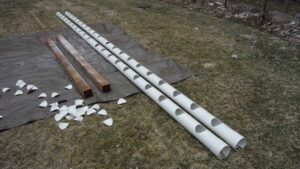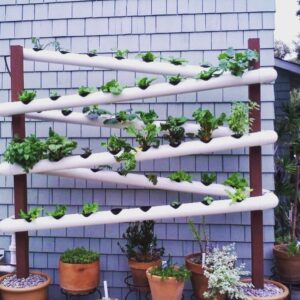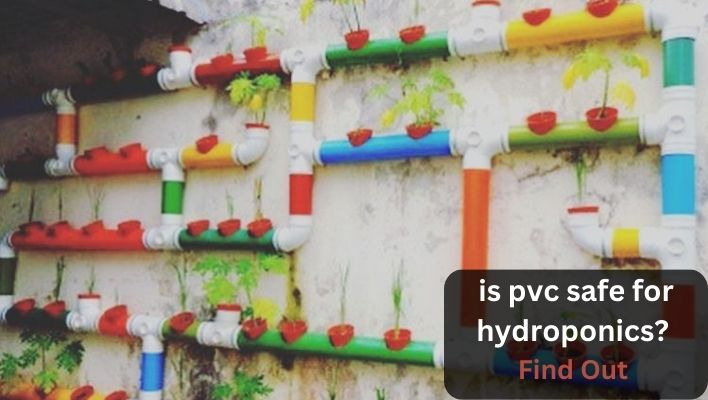Is pvc safe for hydroponics? When it comes to hydroponics, the safety of the materials used is of paramount importance. One material that often comes into question is PVC, also known as polyvinyl chloride.
PVC is a widely used plastic due to its affordability, durability, and versatility. However, concerns have been raised about whether PVC is safe for hydroponic systems.
In this blog post, we’ll dive deep into the topic of PVC and its suitability for hydroponics. We’ll explore the potential risks associated with PVC, such as the leaching of harmful chemicals into the nutrient solution, and address the various factors that can influence its safety.
If you’re an avid hydroponics enthusiast or considering setting up your hydroponic garden, it’s crucial to understand the pros and cons of using PVC in your system. Join us as we uncover the truth about PVC’s safety in hydroponics and help you make informed decisions for your plants’ well-being.
What is PVC?
Polyvinyl chloride, or PVC, is a synthetic plastic polymer that is widely used in various industries due to its durability, versatility, and low cost. PVC is made from a combination of vinyl chloride and other additives, such as plasticizers and stabilizers, which give it its characteristic properties.
PVC has become a popular choice in hydroponics because it is lightweight, flexible, and easy to work with. It can be used to create a wide range of components, such as tubing, grow beds, and irrigation systems.
PVC is also resistant to corrosion, which makes it an ideal material for use in hydroponic systems where water and nutrients are constantly flowing through the components.
Despite its popularity, however, there are concerns about the safety of PVC in hydroponics, particularly in terms of the potential leaching of harmful chemicals into the water and nutrient solution.

Is PVC safe for hydroponics?
Yes, PVC (polyvinyl chloride) is generally considered safe for use in hydroponics systems. PVC pipes and fittings are commonly used in hydroponic setups for their durability, affordability, and ease of use.
However, it’s important to note that not all PVC products are created equal. Some PVC formulations may contain additives, such as phthalates or lead, which can be harmful to plants and humans.
Phthalates, which are plasticizers that can interfere with hormones, and bisphenol A (BPA), which is a known endocrine disruptor.
To ensure the safety of your hydroponic system, it’s recommended to use PVC pipes and fittings that are specifically designed for potable (drinking) water applications.
Look for PVC pipes and fittings that are labeled as “NSF-PW” or “NSF-61” certified. These certifications indicate that the PVC product has been tested and approved for use in contact with drinking water and is free from harmful additives.
Additionally, choose PVC pipes that are UV stabilized to prevent degradation when exposed to sunlight.
It’s also important to properly clean and sanitize PVC components before using them in your hydroponic system.
Rinse the pipes and fittings with water and mild soap to remove any manufacturing residues or contaminants.
Overall, when used correctly and with the appropriate certifications, PVC can be a safe and reliable material for hydroponic systems.
However, it’s always a good idea to stay informed about any potential risks and to follow best practices for ensuring the safety of your plants and yourself.
Factors that affect PVC safety in hydroponics
The safety of PVC in hydroponic systems can be impacted by various factors, including:
- Type of PVC: The type of PVC used can influence its safety. Some PVC formulations may contain more harmful chemicals than others.
- Exposure time and frequency: The longer PVC is exposed to water and nutrient solutions, the greater the risk of chemical leaching. Additionally, frequent exposure to these substances can increase the risk of leaching over time.
- Chemicals used in the system: The type of chemicals used in the hydroponic system, such as fertilizers and pesticides, can impact the degree of chemical leaching from the PVC components.
- pH level of the nutrient solution: The pH level of the nutrient solution can affect the degree of chemical leaching from the PVC. Acidic solutions, for example, can cause more chemical leaching than alkaline solutions.
It’s important to note that the specific degree to which these factors impact the safety of PVC in hydroponics can vary based on the individual circumstances of each hydroponic system. As a result, it’s crucial to carefully monitor and maintain the system to minimize any potential risks.

Advantages and disadvantages of PVC
PVC has both advantages and disadvantages as a material for hydroponic systems. Here are some of the key factors to consider:
Advantages:
- PVC is a lightweight and flexible material that is easy to work with.
- It is highly resistant to corrosion, making it durable and long-lasting.
- PVC is relatively inexpensive compared to other materials used in hydroponics.
- It is available in a variety of shapes and sizes, allowing for customization to fit different system designs.
Disadvantages:
- PVC is not biodegradable, so it can have a negative environmental impact.
- Chemicals used in PVC production and additives like plasticizers and stabilizers may be harmful to human health and the environment.
- PVC may leach chemicals into the water and nutrient solution over time, potentially harming the plants and reducing the quality of the produce.
- PVC can be affected by temperature changes and exposure to sunlight, leading to degradation and brittleness over time.
While PVC does have advantages in terms of cost and durability, it’s important to carefully consider the potential risks and drawbacks before choosing PVC as a material for a hydroponic system.
Alternatives to PVC in hydroponics
If you’re concerned about the potential risks associated with PVC in hydroponic systems, there are several alternative materials to consider. Here’s an overview of some of the most commonly used alternatives:
- ABS plastic: ABS plastic is a lightweight and durable thermoplastic that is resistant to corrosion and chemicals. It is a popular choice for hydroponic systems due to its affordability and ease of use. However, ABS plastic can also leach chemicals into the nutrient solution over time, so it’s important to choose high-quality, food-grade ABS plastic and monitor the system carefully.
- Polyethylene: Polyethylene is a strong and flexible material that is often used for piping in hydroponic systems. It is resistant to most chemicals and UV light, making it a durable option for outdoor systems. However, polyethylene can be more expensive than PVC and may be more difficult to work with.
- Glass: Glass is a non-reactive material that is completely inert, making it an excellent choice for hydroponic systems where purity is essential. Glass is also easy to clean and sterilize, and it doesn’t degrade over time. However, glass can be fragile and more expensive than other materials.
- Clay pebbles: Clay pebbles are a natural, inert, and pH-neutral medium that can be used as a substitute for PVC piping in hydroponic systems. They provide good drainage and aeration for plant roots and can be reused multiple times. However, clay pebbles are more expensive than other materials and can be heavy, which may require additional support for the hydroponic system.
When considering alternative materials for your hydroponic system, it’s important to weigh the pros and cons of each option and consider your individual needs and preferences.
Ultimately, the most suitable material will depend on your specific circumstances and goals for your hydroponic system.

FAQs
What types of PVC are safe for hydroponics?
Not all types of PVC are suitable for hydroponic systems. It’s important to choose PVC that is food-safe and does not contain harmful chemicals or plasticizers.
PVC that is marked with NSF-51 or NSF-61 certification is considered safe for use in contact with food and water.
Can PVC leach chemicals into the nutrient solution?
PVC can potentially leach chemicals into the nutrient solution over time, particularly if the system is exposed to high temperatures, sunlight, or acidic or alkaline nutrient solutions.
This can potentially harm the plants and reduce the quality of the produce. However, using food-safe PVC and monitoring the system for any signs of degradation can help minimize this risk.
How can I minimize the risks associated with PVC in hydroponics?
To minimize the risks associated with PVC in hydroponics, it’s important to choose food-safe PVC and monitor the system for any signs of degradation.
This can include regularly checking for leaks, discoloration, or brittleness. Using alternative materials, such as ABS plastic or polyethylene, may also be a viable option.
Are there any regulations or guidelines for PVC use in hydroponics?
There are currently no specific regulations or guidelines for PVC use in hydroponics. However, it’s important to follow general guidelines for safe food production and handling, as well as any applicable local or regional regulations related to the use of plastics in agricultural or food production.
What are the benefits of using PVC in hydroponics?
PVC has several benefits as a material for hydroponic systems, including its flexibility, durability, and relatively low cost compared to other materials.
It is also resistant to corrosion and can be easily customized to fit different system designs.
However, it’s important to carefully weigh these benefits against the potential risks associated with PVC use in hydroponics.
Conclusion
PVC is a commonly used material in hydroponic systems due to its flexibility, durability, and affordability. However, there are potential safety concerns associated with PVC use in hydroponics, such as the leaching of harmful chemicals into the nutrient solution.
To minimize these risks, choosing food-safe PVC, monitoring the system for signs of degradation, and considering alternative materials such as ABS plastic, polyethylene, glass, or clay pebbles are important.
While PVC may have advantages, it’s crucial to carefully consider its potential risks and benefits in hydroponics. Choosing the right material for your hydroponic system will ultimately depend on your specific needs and priorities.
By weighing the pros and cons of different materials and staying informed about the latest research and guidelines, you can help ensure the safety and success of your hydroponic gardening endeavors.
